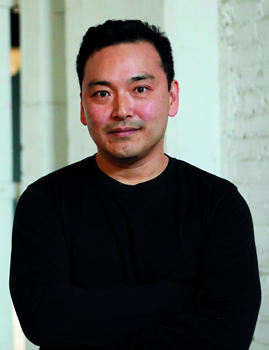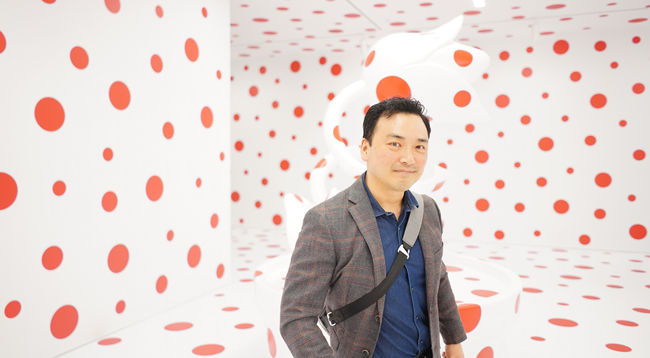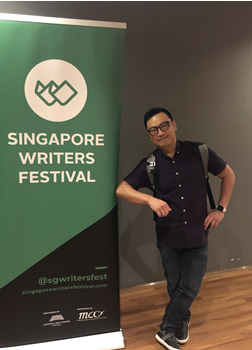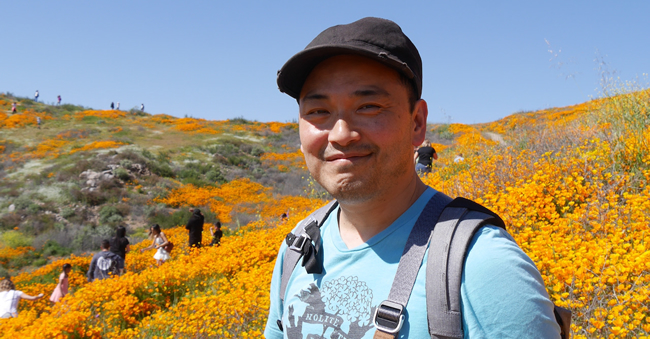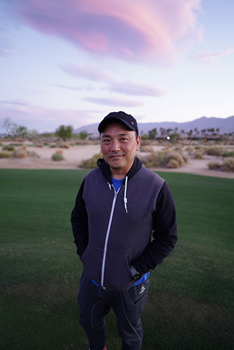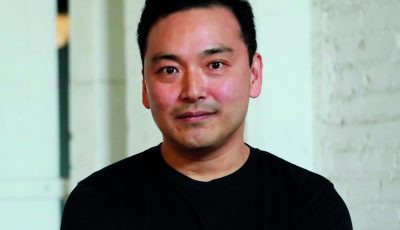

On the Cover: David Yoon
To Internet, or Not to Internet?
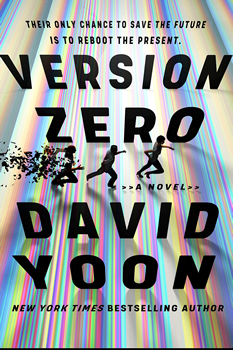 By Dawn Ius
By Dawn Ius
Do we actually need the internet? Like, truly need it? Does it even offer value?
For those of you wiping the coffee off your computer screen after a hearty guffaw, hear me—or rather, hear bestselling author David Yoon—out.
These are the driving questions behind VERSION ZERO, Yoon’s pacey, eerily perceptive adult thriller that takes a hard look at whether the internet creates more problems than it solves, and most importantly, what the internet does—or doesn’t—do for us.
“In other words, do we make lip-sync jump-cut videos on TikTok because we want to, or do we do it because TikTok tells us what to want in the first place?” Yoon asks.
VERSION ZERO assumes the worst. In it, a data-whiz at a Facebook-like social media company begins to question his employer’s motives when he realizes what they intend to do with the data they collect from their users.
Now unemployed and blackballed from Silicon Valley, Max and his friend Akiko decide to avenge his wrongful dismissal by essentially rebooting the internet. But when the two team up with a reclusive tech baron, it’s clear they’re in way over their heads—and the consequences of their actions could have a terrifying and dangerous ripple effect.
Award-winning author Yoon, who is known for his bestselling young adult novels Frankly in Love and Super Fake Love Song, takes us deep into the psyche of his characters and his story in this in-depth interview with The Big Thrill.
VERSION ZERO is such a relatable book—there are few of us (if any) who can say we haven’t been impacted by social media in some way, for better or worse. VERSION ZERO certainly outlines a “worst case” type scenario. What inspired this story?
Social media has become so interwoven with our daily lives that if you’re not on it, people wonder if something’s wrong with you. It’d be like not having a phone or credit card or mailing address. I was mostly inspired to write this book because of my years working in the tech industry, which was full of ingenuity, but also profound paradoxes. At an ad tech company, everyone used ad blockers; at a social media company, users’ information and photos (even “private” or “deleted” stuff) were routine gossip fodder among coworkers. My work experience made me realize not just that we were living under massive surveillance capitalism, but that we were actually pretty comfortable with it. A pretty bizarre thing to realize! As social media became even more important politically, I knew I had to delve into its inner workings and consequences and possible alternatives, if there even were any.
It’s tough to find a silver lining in the pandemic, but I do think the past year has forced society to slow down a bit and question things that we may not have questioned before. In VERSION ZERO, Max questions the work his company is doing and ultimately gets fired. I’d love to hear more about how his character formed for you.
The pandemic has definitely slowed me down in many ways, but in other ways it’s also sped me up—being cooped up at home made me consume news and online content at a frantic pace, to the point where I had a very real spike in anxiety and had to detox. It made me question why ordinary people seem to be so vulnerable to media over-consumption to the point of self-harm. This situation, coupled with tech companies’ insatiable appetite for every last morsel of user data, has really proven to be a kind of perfect cyclical storm that feeds on itself.
Max comes to this realization early on in the book when he discovers his social media employer is planning on selling sensitive user data to government agencies around the world. He freaks out, because he realizes that data collection is basically a gigantic social experiment that can only grow in one direction: bigger, more pervasive, more invasive, with the logical extreme being a limitless global panopticon. Max wonders—like I think we all do—where it’s all headed, and what it’s even good for in the first place. Then he begins to challenge the preconceived notions of our internet reality.
It’s funny: once upon a time, we used to rebel against being categorized and assigned a numerical value of worth. Now, we happily embrace search algorithm hashtags and like counts. People would for sure be upset if one day those things mysteriously vanished, right. But that response itself can’t be healthy! Max and his friends hack the system to shock the public into awareness of how dependent we’ve become on tech to drip-feed us desperately needed emotional validation.
How did your extensive background in the tech world inform the writing of VERSION ZERO in terms of authenticity?
For years since the early days of the World Wide Web, I worked as an interface designer and then as a user experience expert for all kinds of companies. I got a really good sense of how the internet sausage is made—how user data is recut and packaged and sold, how nothing ever really gets deleted, how brilliant engineers build ingenious solutions to satisfy the whims of a tiny elite cabal of venture capitalists obsessed with getting as many people to spend as much time fiddling with their apps.
People always say it’s not the technology but what we choose to do with it, but I disagree. Technologies are inherently biased to encourage certain types of behavior. A shovel encourages digging, not calligraphy. A flamethrower encourages scorched earth, not crème brûlée. What does all this internet tech encourage? Doubt? Social envy? Amusement, relaxation? And what do these responses promote in turn? Fulfillment? Happiness? Anxiety?
I’d say that VERSION ZERO is a cautionary tale, but I think we’re already too far in for that. What message would you like readers to take from this book?
Too far indeed! We’ve seen how the internet has slammed the accelerator of society to speed us into a totally new world of unprecedented uncertainty. I just hope VERSION ZERO makes people be a little more aware that the internet is not some abstract utility like tap water—it’s made up of physical computers running on electricity and maintained by millions of humans tapping away at computers. These humans have their own particular goals and intents, and what they build can influence your own goals and intents as well.
VERSION ZERO delves into some dark territory, but it’s lightened by some really great humor, and of course, your exceptional prose. What do you think is the role of humor in dark stories? How do you balance it?
I’m a huge fan of comedy and tragedy sitting side by side at the same time. I think that kind of juxtaposition rings really true. Bad things happen, and sometimes they’re so incredibly bad that there’s nothing left to do but laugh at the absurdity of life. I think humor is a way of preemptively moving on, because you have to learn how to move on from things if you’re going to survive this life.
You see this comic-tragic simultaneity a lot, especially in Korean horror movies, which aren’t afraid to mix in humor, romance, horror, just everything, using characters ranging from little kids all the way to old people. Just brilliant stuff. These movies really embrace the fact that life is often out of your control, and they’re a refreshing change from American fare, which likes to spin fantasies of single individuals bending the world to their will. Max’s journey lies somewhere in between. As his hacks get crazier and crazier, his own mission begins to twist its way out of his grip. He realizes how little control he ever had to begin with—how little control anyone actually has, really.
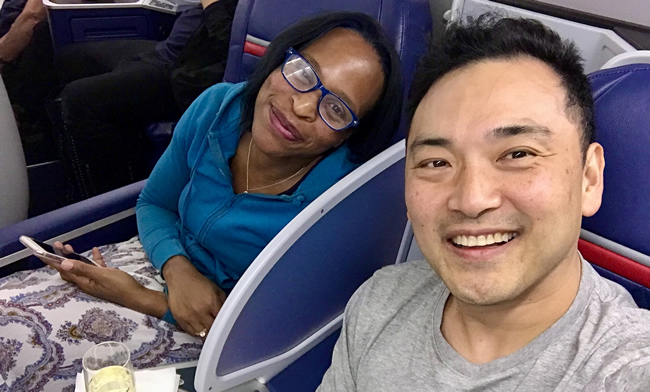
Yoon and his wife, author Nicola Yoon, en route to promote the movie adaptation of Nicola’s 2016 book The Sun Is Also a Star in New York City in May 2019
VERSION ZERO is like a mastercraft lesson when it comes to pacing—this is a roller coaster of a ride. What advice would you give to writers who are trying to nail the pacing?
First of all, THANK YOU for the kind words! I worked super hard to make this the most fun, pacey read I could. I’m a big, big fan of short chapters, because from a craft perspective it forces me as a writer to be as concise and Elmore Leonardian as possible. So the advice you’ve heard is true: start a scene as late as you can, and get out as early as you can. Write from the heart, and write with empathy, even for evil, misguided characters. Bonus: write funny! So much of life is weird and unexpected and hilarious. Have your fictional world reflect that too.
I’m also a total story structure junkie—the three-act structure works just like a BLT sandwich works, and I never find myself wishing someone would reinvent the BLT. I’ve even put little stickers on my TV bezel to help me keep track of act break and midpoint highs and lows in movies. Paying attention to story structure has trained me to pay close attention to my own emotional responses as I experience a story, which in turn makes me really respect the effectiveness of another writer’s craft skills. Make a habit of mapping out stories, even on graph paper if you want.
The is your first foray into adult fiction, correct? How challenging—or not—was it to shift from a YA mentality to write this novel? Will you be revisiting the adult fiction world again?
I’ve always written from multiple age perspectives, actually. My short story anthology dissertation for Emerson College was mostly stories about middle-grade kids in trouble, oddly enough. I vividly remember what it was like to be in high school and think about it often, because so much of your fundamental you-ness forms early on and carries on for your whole life. I’m almost 50 now, but I can see myself and my friends still doing all the crap we used to do when we were teens, just in slightly updated ways. And watching my daughter (who is nine) and my mom (who is 79) has taught me that people from every age can teach you something about the age you’re currently at.
That all said, I definitely have plans to write more YA stuff in the future, as well as adult (see below). Right now I think the biggest difference for me between YA and adult is that YA tends to deal with the teachable Known, whereas adult seems to explore more of the nebulous Unknown. This probably has to do with the fact that a lot of YA is sold through teachers and librarians, who have an obligation to educate our youth with usable information, but I find it super fulfilling to write for both categories.
Last year, you and your also very talented wife, Nicola, announced an exciting new venture—Joy Revolution, an imprint at Random House that will focus on telling YA love stories featuring characters of color. Is there any additional news you can share about this?
Sure! We’re really excited to have signed on the incredibly talented Talia Hibbert for two books, starting with Highly Suspicious, Unfairly Cute. Talia has this virtuosic sensitivity that allows her to write hilarious and poignant and sexy scenes with equal brilliance. We’ve also acquired romance veteran Amalie Howard’s Queen Bee, this super-smart, super-fun Bridgerton-style regency romp whose pages basically turn themselves. There’s of course other things I can’t announce yet, but so far we’ve been humbled and impressed beyond belief that there are so many joyful stories starring people of color out there to choose from. It’s truly an exciting time for publishing.
What can you tell us about your next project? (And perhaps just as importantly, when can we get our hands on it?)
So my next book is an adult novel called City of Orange, about this guy who wakes up in a world that has ended and must struggle against his failing memory to find out if his wife and child are still alive. It’s a very quiet apocalypse, though, and is more about intimately exploring our hero’s past, everything he lost, and why. No word on pub dates yet, but like with VERSION ZERO I’m publishing under Putnam with my soul-searching, mind-reading editor Mark Tavani.
For all you writing nerds, this book started as a coffee-fueled, NaNoWriMo answer to my own writing prompt of: What’s the worst thing in the world that could happen to you? NaNoWriMo is the best—do it if you can and just push that big first draft baby out!
- On the Cover: Alisa Lynn Valdés - March 31, 2023
- On the Cover: Melissa Cassera - March 31, 2023
- Behind the Scenes: From Book to Netflix - March 31, 2023

